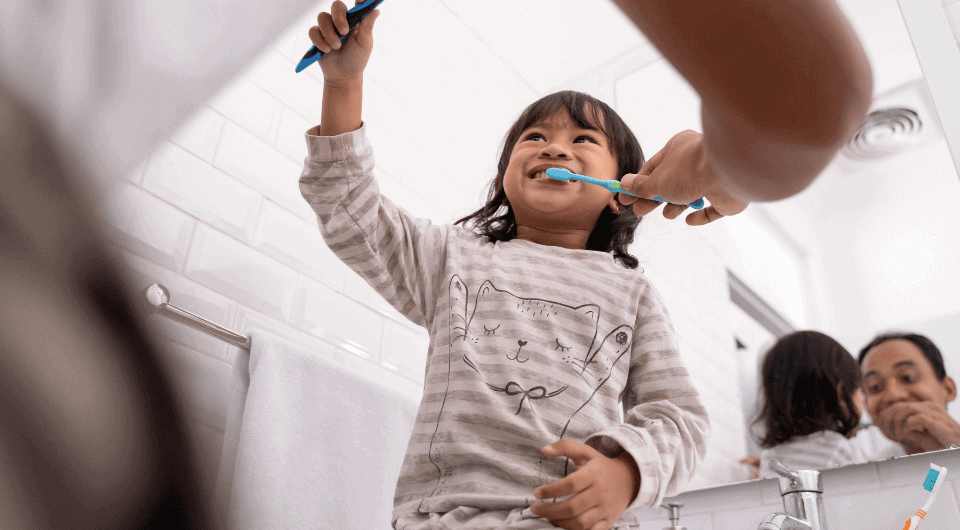
Posted on: 01 September, 2021
Getting your child to brush their teeth properly can be challenging. Try these 8 tips to help kids adopt good oral hygiene habits by making toothbrushing fun!
3 minute read
Brushing teeth twice a day is important at all ages, but especially for children whose teeth are still developing and more vulnerable to plaque and tooth decay.
You know that brushing your teeth is important, but it's not always so easy to convince kids to brush, let alone for the recommended two minutes!
If you need some help encouraging your little one to get into a good habit, try these 8 tips to make brushing a fun experience.
A children's dentist can give you more advice about toothbrushing and other oral hygiene habits to give them the best start towards a lifetime of healthy teeth and gums.
Children need special toothbrushes that fit their mouths and are easy to hold. These should have a small head and soft bristles that won't scratch their teeth.
With this in mind, there's a huge variety of kids' toothbrushes available. You can choose a toothbrush you think they'll like, but letting them choose it for themselves could make them more likely to use it.
They could find a toothbrush in their favourite colour, featuring their favourite character or shaped like their favourite animal.
Electric toothbrushes for kids can be even more appealing, with lights and sounds. Some children find electric toothbrushes easier to use, which can make them more effective at getting the job done.
Young children should use low-fluoride children's toothpaste until around the age of 6, by which time it’s usually safe to start using a pea-sized amount of normal toothpaste.
Like toothbrushes, they might find toothpaste endorsed by their favourite characters or a toothpaste in a fruity flavour, such as berry or bubble gum.
The downside of tasty toothpaste is that little ones may be more tempted to swallow it, so it's important to teach them to spit it out.
Good preventive care habits should start early, and if your little one wants to take charge of their own teeth brushing, this independence should be encouraged.
Show them how to move the toothbrush around their mouth to ensure even cleaning and make sure they spit out the toothpaste.
Of course, you'll have to do it again for them, to make sure they're getting a proper clean until they develop the dexterity to do it themselves! Usually up to the age of 4 to 5 years, you’ll need to keep brushing for them to ensure it’s done properly.
Toothbrushing will feel less like a chore you're imposing on your kids when you lead by example and brush together.
When children watch their parents or siblings in the mirror, they can mimic your actions and follow your guidance. Be sure to brush for the full two minutes.
If your child loves to take care of their favourite bear or doll, make toothbrushing a part of their routine. This can help them to practise their movements and timing.
Get a separate toothbrush for the toy to avoid the transfer of germs and leave out the toothpaste, of course!
If you struggle to keep track of two minutes when brushing your teeth, a well-timed song will keep you on track, as well as help the time to pass quickly and enjoyably for little ones.
Remember to account for preparation time, and it's better to run a little over time than under.
Toothbrushing apps are more than just timers. Some also feature toothbrushing songs and instructional videos to help keep kids on track.
Some apps let you configure profiles for all the family and give stars or other rewards the more you use them.
If they still need some motivation to get brushing, you can reward good behaviour with stickers, a bedtime story, a video or other rewards.
If these small rewards aren't enough, you could keep a running score and save up for a bigger treat every once in a while.
Just make sure these rewards aren't sugar or carb-based, or you'll undo their great work!
You should brush a child's teeth as soon as they have them. Use a low-fluoride toothpaste until children are around 6 years old, or when their dentist advises it.
Most children can brush their own teeth by around 8 years old. Before that, they'll need your assistance to make sure they're doing it properly and aren't missing spots.
To brush children's teeth:
Good toothbrushing is just the start of a good oral hygiene routine. You should also:
Preventive treatments for kids can include:
Your child's dentist will recommend how often they should visit based on their individual needs and risks.
Our dentists at Mount Lawley Dental have extensive experience helping children and their families to take better care of their teeth.
If your child is due for their check-up or you're worried about their teeth, call our friendly team on 08 9227 8777 to book an appointment at our North Perth dental clinic today.
Want to know how you can help your child adoby good oral health habits? Check out our Top 7 Oral Health Habits for Kids, next!
https://www.betterhealth.vic.gov.au/health/conditionsandtreatments/toothbrushing-children
https://www.healthywa.wa.gov.au/Articles/A_E/Brushing-your-childs-teeth